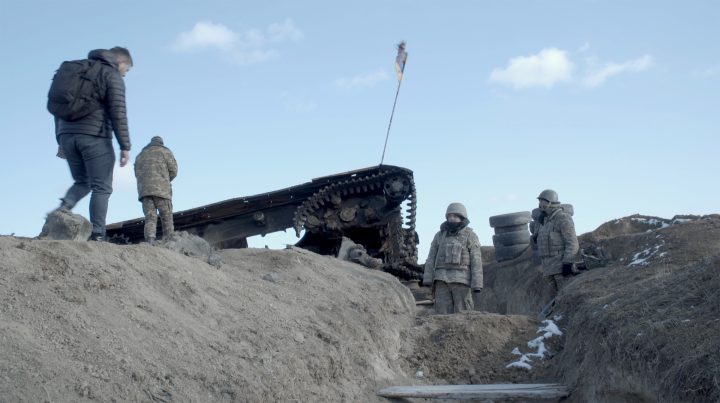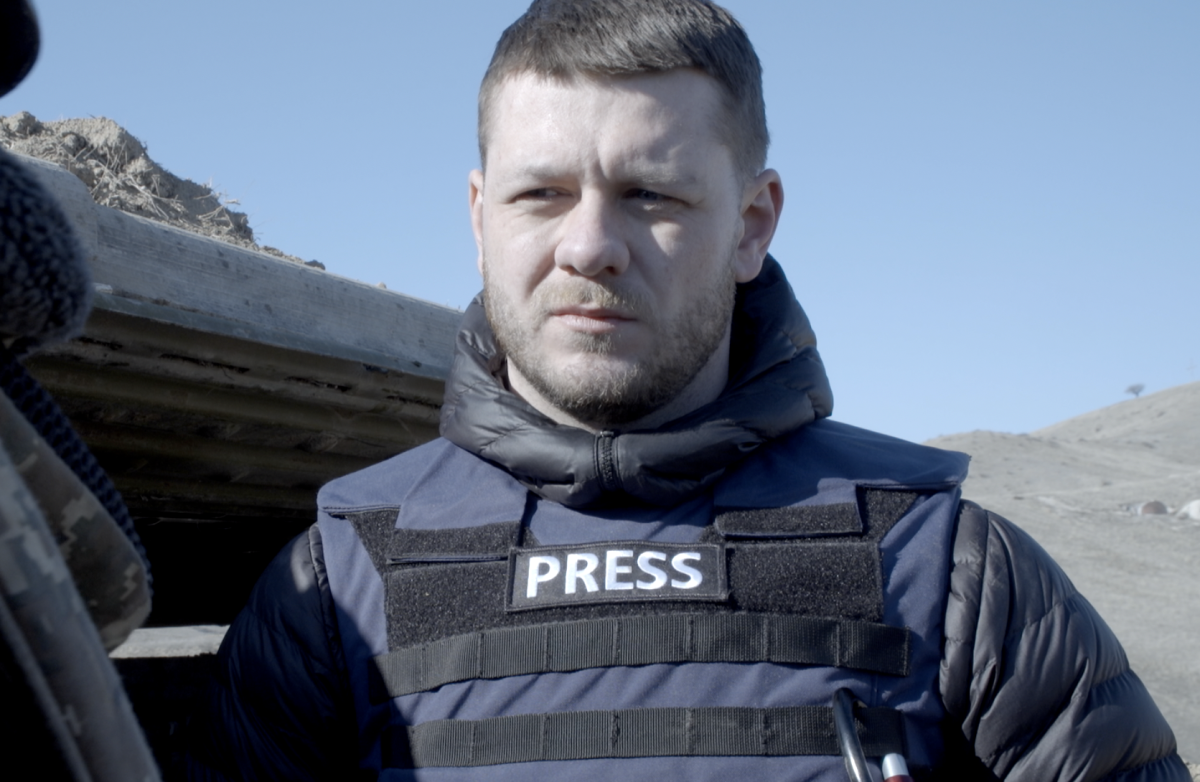
Last fall’s 44-day war against the unrecognized Republic of Artsakh and Armenia by Azerbaijan, Turkey, and their allies barely registered with most people in the US, since Presidential election coverage dominated our screens. The situation wasn’t much better elsewhere, as most Western European media disproportionately showed the Azerbaijani perspective over those of indigenous Armenians fighting for self-determination from a state that, for the last three decades, has proved again and again that it is committed to a policy of ethnic cleansing and cultural genocide against them.
Faced with that clear asymmetry, most news junkies, like me, have been gradually turning to independent war reporters. In the last few years, these people have found few opportunities at conventional news agencies, and so have become one-person media platforms — a reality I can very much relate to, as a cofounder of Hyperallergic.
In regards to the conflict in Artsakh (also known as Karabkh), some recent “stars” of this wave include Emil Ghessen and Jake Hanrahan in the English-language mediascape and WarGonzo founder Semyon Pegov in the Russian-speaking world. These men (and yes, they appear to largely be men) have built followings by placing themselves on the frontlines and sharing photos, videos, and other eyewitness accounts. Only a decade ago, such conflicts were almost exclusively presented through the eyes of state and corporate news organizations. These gonzo journalists have already proved themselves indispensable during times of crisis, when families and loved ones cling to every shred of news to grasp a better understanding of volatile situations. While there were reporters in Armenia also doing important work, particularly at independent outfits like Civilnet and Hetq, they were more strictly monitored by wartime government observers than foreign journalists. Meanwhile in Azerbaijan, the dictatorship strictly controlled all media, and the few nonprofits that cover the region (which tend to focus on the former Soviet space and are funded by foundations like Open Society) did a mostly mediocre job. All this is in contrast to the amateur “news” channels that have cropped up on social media in the last few years, and which crowd out real journalism in favor of soundbites, unverified information, gossip, and reblogs.

Hanrahan, a British reporter, was unique in that he not only covered the war for a long stretch of time, but also decided to create a documentary about it, titled Ghosts of Karabakh. The 36-minute film is a clear look at the frontlines in Artsakh itself. (Hanrahan was never granted permission by the Azerbaijani government to report there.) The style is stark, in many ways is what Vice News video reports pretend to be — a DIY effort bringing viewers as close to the raw truth as possible (it’s worth mentioning that Hanrahan has created reports for Vice as well). Hanrahan and his outlet, Popular Front, are not only making documentaries, but also producing a widely listened-to podcast. He’s become a dynamic source on conflicts as diverse as Artsakh, Syria, Tigray, Ukraine, Seattle, Hong Kong, and Serbia. It’s an extraordinary media outfit that I’ve often turned to for a less filtered perspective on global events. The documentaries vary in video quality and editing, but I actually find that more endearing, demonstrating the real-time limitations of working in the field and the financial and labor issues that crop up with every project — trust me, I also know a lot about this.
But that’s not to say things have been smooth for Hanrahan and Popular Front. He informed Hyperallergic that YouTube has completely demonetized the channel, so every time he makes a documentary, he actually loses money. He raised £2,000 (around $2,800) for Ghosts of Karabakh from fans and followers, but he admits it cost much more than that to make. Still, he does this because he knows the work is vital — I agree. For Ghosts of Karabakh, YouTube also inexplicably slapped on a “inappropriate or offensive to some audiences” content warning, which viewers must click through before they can watch. It’s a strange addition, considering the film does not contain anything particularly graphic, violent, or out of the ordinary for any news report. YouTube also does not allow the video to be embedded on other sites, which you can see for yourself see below.
“Honestly, I got sick of commissioning editors who are completely out of touch with their audience telling me what people are and aren’t interested in,” Hanrahan explained to Hyperallergic. “These commissioners sit in their offices making hundreds of thousands a year doing very little — they’re never in the field, many of them have never even been in the field, yet they dictate what people in the field get to do. I’ve been reporting on war and conflict on the ground, on the frontlines, since I was 24 years old. By the time I was 28, I found myself constantly battling with these short-minded editors, and I was getting sick of it. I wasn’t seeing the kind of journalism I wanted to make and I was constantly broke, so I thought, fuck it, I’ll start my own thing, and if it fails it fails. I started Popular Front in 2018 with a grassroots ethos, and ever since it’s been doing great. I’m really happy with the growth. We’re free to report on whatever we want and there’s no corporate investment dictating what we do. Popular Front is always adversarial as well; I think journalism is supposed to be like that.”
Without any institutional or foundation support, he relies on Patreon and his (at the time of writing) 1,786 patrons, including myself, to create his work. “Almost all the money we make is done via our Patreon, where we release regular bonus content for a small monthly fee. I do it this way because I want Popular Front to remain 100% independent,” he says. “I don’t want money from anywhere that exploits its workers or treats its people like shit. I can’t have that. I’m not against making money, of course, I’m not some teenage activist, but I just think allowing that kind of corporate money into something like war reporting muddies the waters. It just makes it a bit dirty for me. I’ve seen corporate money ruin good media too. It changes things. No one is going to give you huge amounts of money without wanting some influence on your final product. I won’t have that. No bugmen on my lunch, thank you. I don’t know how sustainable it is like this, but all I know is it feels like we’re making important journalism. If there are any non-psychopath rich lads out there who want to help us, hit me up. But otherwise, we’re going to continue making what we can via our subscriptions on Patreon.”
Ghosts of Karabakh represents a growing wave of documentaries that are doing it better than the legacy organizations that are still relying on old notions of “objectivity” devoid of any understanding of power dynamics and institutionalized repression. He is part of a new crop of hungry journalists working on shoestring budgets, staying critical of funding sources, and revealing as much about the labor of journalism as they do about the subjects themselves. For those of us who have become cynical news junkies, Popular Front is a breath of fresh air.
“I don’t give a shit what someone’s politics are, or what offends them, I just want to show what’s going on,” he explains. “The only real political stance Popular Front has is that we’re completely against authoritarianism of any kind, left or right. Other than that I’m not interested. I’m so bored of that whole culture wars nonsense. I’m not involved. At Popular Front we report on war and conflict in an in-depth manner. That’s what we do. We’re not feigning some kind of psychotic ‘100% neutrality’ either, that’s just not human. When bad shit is happening, we will always show it.”
Will outfits like Popular Front change the field? I hope so, and there are small signs it might just be. “I tell you what though,” he says, “since starting Popular Front, loads of legacy media companies that used to ignore my pitches are now coming to us asking us to make stuff for them. That’s pretty ironic. Gives me a laugh, that. So yeah, I do freelance stuff still, but often I funnel that money back into Popular Front from my own pocket. So long as I continue this project and keep improving it, it’ll all be worth it.”
0 Commentaires